Merrick again...
An AICN reader called And Still Not Ginger got a chance to check out CRASH OF THE ELYSIUM (site HERE) - an interactive theater production developed in association with Steven Moffat and featuring appearances by Matt Smith.
And Still Not Ginger was kind enough to end in some perspective on the experience, which we truly appreciate. I've heard wonderful things about this production - I really wish I could see it myself.
Here's And Still Not Ginger...
Doctor Who: Crash of the Elysium is a new performance from experiential theatre group Punchdrunk in conjunction with The Manchester International Festival. Their work, which traditionally sees you interact with a play as it progresses, has gained critical acclaim. And for good reason.
This year, they have developed a show, in conjunction with the BBC, based on a Doctor Who adventure. The performance, which is designed for children aimed between 6 and 12 year’s old, sees the audience take part in the adventure, accompanied with a number of actors who travel around the different sets with the audience.
Despite it being a show aimed at children, there are, however, a limited number of adult performances. Which I was lucky enough to attend. Sadly, no photos were allowed in the performance. Use your imagination. HERE BE SPOILERS!
The show starts off in a museum exhibit. Inside, you are presented with numerous cabinets of ‘artifacts’ from The Elysium, a trade ship which sank back in ye olden times. It’s all very authentic, with placards on the wall of the crew, its manifest and various vintage trinkets. The attention to detail is spectacular.
Eventually, the curator of the museum enters the room and begins to explain the history of the Elysium, taking you through a slideshow of vintage photographs of the ship being constructed and launched. It’s immersive stuff and totally authentic.
Things start to go tits up after this point with the entry of two very serious soldiers, barging into the room and screaming about national security. Something has happened nearby and we’re going to have to help them. The pair ask the audience to leave the building and everyone sprints across to a hanger nearby. There’s a lot of running.
Now, we’re donning white hazmat suits and gas masks, being assigned teams and being briefed on the situation. An alien ship has crashed in Manchester and we’re told that we’re responsible for the rescue of a survivor, ‘a doctor’. We’re all assigned numbers and asked, in military tradition, to sound off. Again, these actors play it straight. I got shouted at for not running fast enough.
We’re taken into a huge room, via ET-esque plastic tubes, where a space ship, also called the Elysium, has crashed - its silver hull covers the far wall. We’re commanded to hunt around for clues. Our team is assigned the job of getting information from two ‘scientists’ in the corner studying a table of artifacts. Another group goes hunting for the ‘black box’. We ask the scientists questions and they respond. It’s all serious stuff. Life and death stuff.
Eventually, someone in the audience finds the black box, which the army chaps plug into a bank of monitors stacked in the middle of the room. It’s a video message from The Doctor, Matt Smith in full crazy mode, who is trapped inside The Elysium sans Tardis. The Elysium, it transpires, is a high-security art gallery which contains some of the most dangerous artifacts in the galaxy. Our job is to enter the Elysium, find The Tardis, and rescue The Doctor.“Don’t blin...” he says, before the video turns to static.
We wait as one of the army team blow torches a hole into The Elysium to create a doorway.
The Elysium is a dark mess. Pipes hang from the ceiling, wires brush across your face, smoke billows from the corners of the corridors. It’s grim stuff. It’s also very hard to see. The soldier’s torches shine in your face and you get bunched up with other guests as you step through its claustrophobic corridors.
Something crashes in the darkness. The soldiers freak out. There’s a lot of running. A Weeping Angel makes an appearance and a shadowy figure starts running at us from the corridor we had just stumbled down. All the Doctor’s enemies are here for his Tardis, he’ll later explain via a video.
Later: “What is it?” one of the soldiers screams at us, taking one look at a Weeping Angel statue, its hands covering its face. Someone tells him what a Weeping Angel is. He reports it back to base via his radio.
What follows is an intensive crash course in experiential theatre. There are clues to solve; we restore power to the ship, find several more video messages from The Doctor (he needs us to destroy The Tardis to stop his enemies gaining its power) and enter a wrecked alien control room. A member of our group is asked to jam a door shut as something tries to force its way in. It’s terrifying. We also find the key to The Tardis.
Suffice it to say, the Weeping Angel eventually catches up with us. The lights go on and off as it slowly moves towards us down a dead-end corridor. The soldiers are losing it. The audience is losing it. It’s just like Blink. We’re crammed together against the wall as it gets closer every time the lights flicker. It changes expression as it leers over us. Someone screams.
It touches one of our group and we all get flung back in time. We’re greeted by a woman called Dolly in a room decked out like a Victorian carnival. There are tents, it smells and hay lines the floor. Dolly asks me to pose for a photograph with her (taken with an authentic Victorian camera), before explaining that The Doctor sent her The Tardis to keep it safe. Dolly is a looker. Which probably explains why The Doctor took her to the Moon to celebrate her birthday.
We send the Tardis back to the present (sadly, we don’t get to look inside) and the Doctor sends us another message. He’s going to send us all home through the time rift. Good lad.
But, the shambling monsters have caught up with us and, again, we leg it, this time, through the carnival’s maze of mirrors. Weeping Angels are reflected in all the mirrors. One of the soldiers goes to sort it all out. He screams from behind a wall.
We leg it some more down a dark corridor. Someone starts crying.
We escape through the time rift and find ourselves in the engine room of The Elysium. The soldiers barricade the doors and turn on the CCTV monitors. Angels are coming down all of the corridors towards us. The remaining solider breaks down in tears.
And then we escape. Timey, wimey, wibbly wobbly thing. The Angels have been frozen - the final set piece sees everyone run through a corridor of disabled Angels, trapped in time; arms protruding from walls, and heads leering at us from the ceiling.
The solider salutes us. We salute him. Job done.
And at the end, we get a letter from The Doctor.
It’s brilliant stuff - the closest you can get to actually being in an episode. Kids will love the puzzles and the running. Adults will love the scares. It’s brilliant theatre and well worth a visit. Genuinely silly fun.
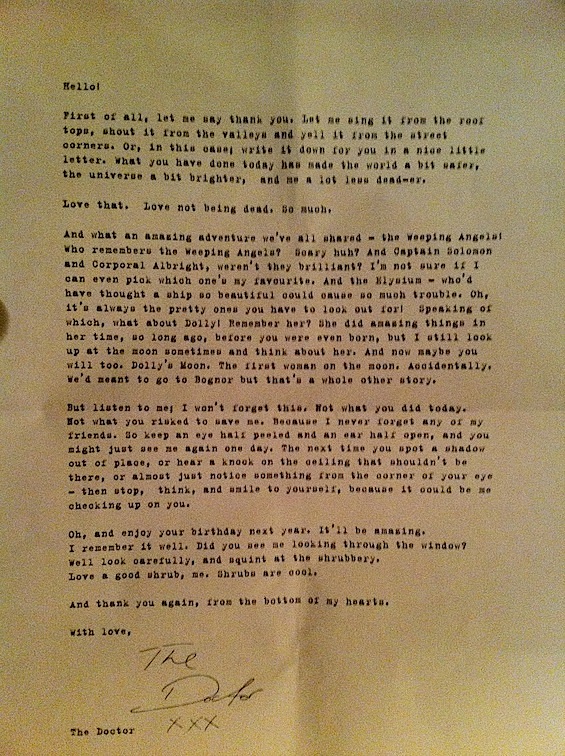
________________________________________
Merrick here…
…with a look at "The Daleks" and "The Awakening," two "older" DOCTOR WHO episodes featuring different Doctors from different eras. And, appropriately enough, the theme for this week's viewing is "time" - one episode had too much of it, the other not enough.
"THE DALEKS" - aka Story #2
"There is no indignity in being afraid to die, but there is terrible shame in being afraid to live."
- Alydon the Thal, DOCTOR WHO, "The Daleks," Part 5 - "The Expedition"
Continuing my relentless campaign to watch every DOCTOR WHO episode ever made (I wish someone would hurry and perfect THIS memory chip- so I could be quickly and magically implanted with perfect recall of every DW story) , this week I caught up with "The Daleks" - the second story for the show as a whole and our first introduction to…well…the Daleks.
Written by Terry Nation, "The Daleks" was subsequently retrofitted to become DR. WHO AND THE DALEKS (watch it for freely and legally HERE). Released in 1965, DR. WHO AND THE DALEKS was the first of two licensed, bizarro-verse DW movies to star Peter Cushing as Dr. Who (that's what the character's called in the films, not my mis-statement of his name).
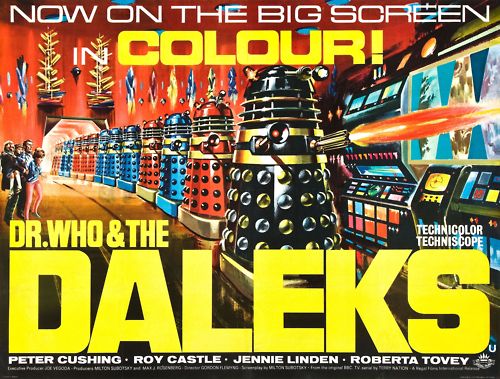
image via http://faultychameleoncircuit.tumblr.com
I saw DWATD late last year, early in my abyssal plunge into all things WHO. While it lacked the general depth and development of "The Daleks" television serial, in retrospect that movie was generally superior in one very critical regard: pacing.
"The Daleks" starts out powerfully and bleakly as The Doctor (William Hartnell), alongside companions Susan Foreman (Carole Ann Ford), Barbara Wright (Jacqueline Hill) and Ian Chesterton (William Russell) arrive on an unknown "totally dead" planet called Skaro. There are silent and motionless forests, a sprawling high-tech city, but no sign of life. While exploring an apparently abandoned and desolate metropolis, they encounter more than they expected...Daleks!
These Daleks are pathetically fussing about in an attempt to cope with radiation that's contaminating their world - this radiation is the result of a "Neutronic War" against their enemy (the Thals) over 500 years earlier. Dalek efforts to address said radioactivity are endangering the surviving Thals, whom the Daleks fear and despise (although we quickly learn that the Daleks' perception/characterization of the Thals is jaundiced and decidedly inaccurate).
It's up to The Doctor, his companions, and a rag-tag group of Thal resistance fighters to thwart the Daleks' radioactive and selfish shenanigans before Skaro is rendered uninhabitable, and the poor Thals are sent the way of the dinosaurs. Given that the Baker-era "Genesis of the Daleks" is set on the same planet during the early days of the Dalek/Thal confrontation, this story essentially serves as both sequel and prequel to "Genesis" and dovetails quite nicely - save for a discontinuitous reference to early Daleks being called Dals (in "Genesis", it's clear that the word "Dalek" is an anagram for their "Kaled" progenitors. Or, did I miss something?)
"The Daleks" comes out of the gate swinging. There's a logical and truthful tension between The Doctor and companions Barbara and Ian - who don't like having been sucked into the predicament they're now in (traveling time and space all willy-nilly with The Doctor, even though they pretty much put themselves in that situation in "An Unearthly Child"). The Doctor's self-centered manipulation of events more or less forces his posse to explore the "abandoned" city, which brings them into contact with the Daleks, resulting in their capture, Ian being temporarily paralyzed, and the entire group becoming critically ill with radiation sickness. I.e. The Doctor's inability to let go of his own needs gravely jeopardizes both him and his fellow travelers. Bleak, hard, atmospheric stuff.
From The Doctor's flawed nature, to Susan's frightened exposure when she's forced to run alone through stormy woods and back to the TARDIS, to Ian and company clumsily trying to figure out out how to work a Dalek….what you call 'em…armature?…suit?…shell?…to the visionary topic of handling radioactive materials...there's tremendous potency and edgy promise suggested by the first four episodes of this story.
But then comes Part 5, in which the story begins to drift a bit, succeeded by Parts 6 and 7 - which spend an inordinate amount of time…doing very little. For example, there's a great deal of detail oriented, procedural mumbo-jumbo about the perils of making one's way through treacherous cavern. A little of which would've been smart and fascinating, but the better part of an entire episode is devoted to the tedium of getting from one place to another. This feels like a bit of stall-out considering we're supposed to be heading towards our final confrontation with the Daleks. A few weeks ago I accused "Frontios" of attempting to spread too little story over to much time, and I charge that the same is true here - "The Daleks" feels like a five part episode spread over seven installments. And with that much flab, even a story as fundamentally compelling as this can't hold together.
When all is said and done, and despite the beguiling beauty of Virginia Wetherell as Dyoni the Thal…
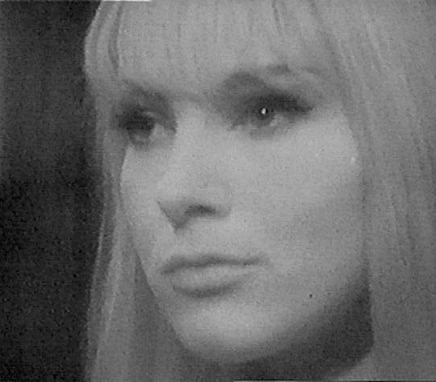
image via TardisWikia
… "The Daleks" ultimately drift away to disappointment. Scheduling hasn't allowed me to research the matter too thoroughly, but I'm curious about what happened here. One wonders if, literally, story compression wasn't a valid option because The Powers That Be had already committed to filling "X" amount of time with this episode? Or, perhaps the fact that the later two (most troubled) Parts were directed by a different director than Parts 1, 2, 4, and 5 had something to do with it? Or, somewhere along the way, perhaps someone simply dropped the ball. It could also be any combination thereof.
Despite its frustrating shortcomings, it was fun seeing Hartnell's Doctor soften a bit since his initial, "Unearthly Child" outing. I love the fragility of his physicality, his occasional combustibility, and his overall doddering nature - a brilliant conceptualization for a titular hero. I smiled a bit when I learned that the TARDIS had a food synthesizer (pre-dating STAR TREK's replicators) - this is the first time I've encountered it, as I don't recall seeing one referenced in the 2005+ series. Was it? And, lest she go unmentioned, a respectful tip-of-the-hat to Carole Ann Ford, who plays Susan (the Doctor's granddaughter) here. She's quite an amazing performer, utterly investing herself into even the most ludicrous of circumstances - thus selling any scene she's in, and selling it fully.
I've got five Daleks of various sizes sitting on the bookshelf behind me...
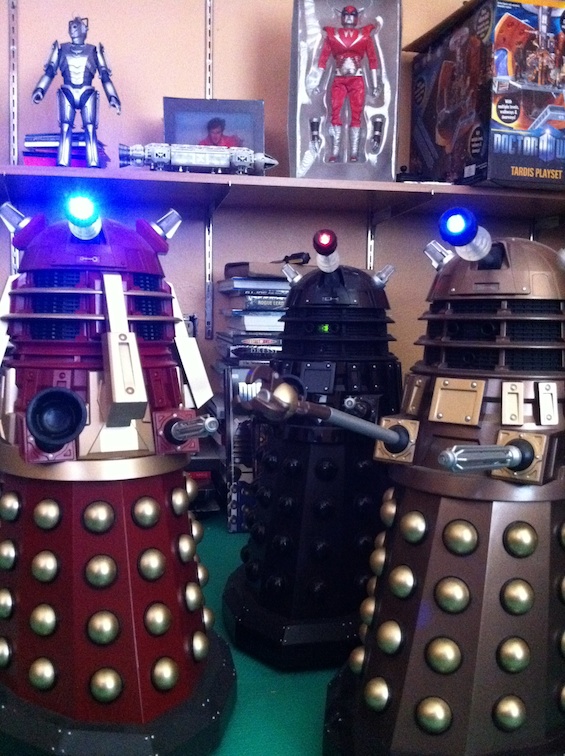
...so it's hard not to feel a little goosebumpy during Part 2's dramatic pull-back/reveal of these dastardly antagonists. This episode launched a critical element of the DOCTOR WHO mythology which endures forty-something years later, and brought about one of the most recognizable icons in Science Fiction history. Too bad the whole of the story doesn't live up to such moments of greatness.
COMING TO DVD NEXT WEEK (U.S)...
"THE AWAKENING' - aka Story #132
Find it in the U.S. HERE, and is available in the U.K. HERE.
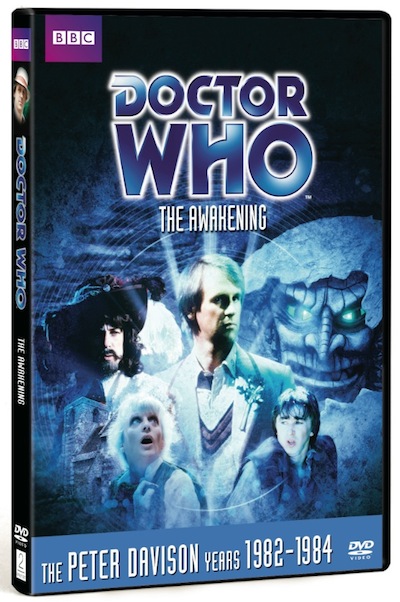
PLOT: Originally entitled "War Games", "The Awakening" finds The Doctor (Peter Davison), Turlough (Mark Strickson) , and Tegan (Janet Fielding) arriving in a modern U.K. town called Little Hodcombe to visit Tegan's grandfather, a local historian called Andrew Verny (Frederick Hall ).
Little Hodcombe is "celebrating" its 1643 destruction - seems the place fell during a battle between Parliamentary forces and king's regiments, and the townspeople appear to be taking their reenactment a bit too seriously.
School teacher Jane Hampden (Polly James) isn't having any of it, much to the chagrin of the celebration's participants. Her incredulity, along with strange phenomenon in the local church, are compounded by the arrival of Will Chandler (Keith Jayne) - a young man who believes he is in 1643. Given the town's ongoing reenactment of that time period, Will's assertion would normally be quickly dismissed…except for the unexplained sounds of large-scale battle (and the smell of gunpowder) which accompany his introduction.
The increasingly nutty town leaders forcibly anoint Tegan as "Queen of the May," a position Miss Hampden implies could meet with a dark and unwelcome fate. Will Tegan end up being killed to appease the town's misguided adherence to history? Is hapless Will Chandler really from the past, and if so, how did he get to our time? And, more significantly, is an alien force called The Malus at work here…encouraging the town's tensions and feeding off of its psychic energies as these celebratory "war games" intensify towards a pitched and potentially deadly climax?
"The Awakening" is a highly imperfect but ultimately interesting little tale which ends up being about more than is evident at face value. By "about more than is evident at face value" I'm referring to subtext - there are a number of thought-provoking issues gliding beneath the surface of this story: how far do we blindly follow leaders before we, ourselves, become personally accountable for their decisions? How easily are we governed by negative energy and our aggressive tendencies, even when such darkness is not what truly lies in our hearts? The list goes on.
Above I mention that "The Daleks" suffers from excessive length (not enough story to adequately fill the number of installments over which it's told). The opposite is true with "The Awakening" - it's a two part story that is refreshingly breezy on the whole, but careens to a not-entirely-clear pay-off that doesn't do justice to the overall episode. This sentiment is both addressed mirrored in the DVD's extras (see below).
High points in this story include a rather well-executed miniature/pyro shot of a church going kablooey, Jack Galloway's deliriously over-the-top performance as Joseph Willow, the striking and unnerving visualization of The Malus (a extraterrestrial entity which feeds on psychic energy, kinda like that little spiny thing in the STAR TREK: THE ORIGINAL SERIES episode "Day of the Dove")...
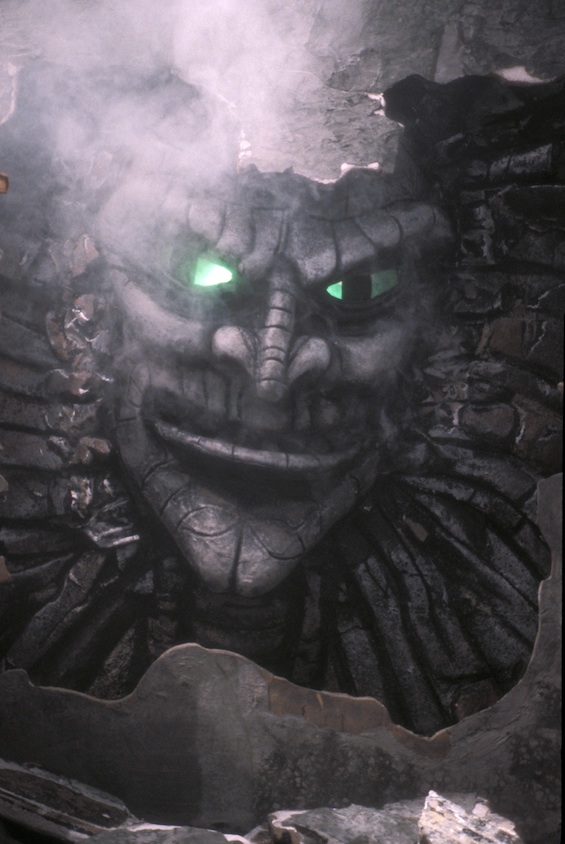
In short, "The Awakening" is a fascinating set-up that ends far too quickly. Had it the luxury of just one more episode, this tale may've emerged as one of the more significant and meaningful entries in
the DOCTOR WHO mythos. As is, it's a nicely conceived, reasonably well-told story that's memorable for its location work and startlingly designed big bad, but frustratingly anemic on resolution. A charming but flawed adventure.
As a side note: length was evidently a challenge for this particular tale from the outset. It was originally planned to be a four-part story, but The Powers That Be encountered difficulties adequately spreading this material over four parts, so it was reduced to two installments. I suppose three parts was, quite understandably, not an option. Too bad.
Extras include…
RETURN TO LITTLE HODCOMBE
--- Episode director Michael Owen Morris - Awakening was his first job.
--- Eric Saward (Script Editor), discusses the condensing of what was intended to be a four part installment into this two part story.
--- recollections from Keith Jayne (Will Chandler)
--- Janet Fielding (Tegan) "What a cruel thing to do to a director...It was just an impossible gig" - talks about feeling protective of first time director Michael Owen Morris, revealing that cast and crew may not've nitpicked script material as much as they otherwise might've in an effort to make his job easier (which may've actually made his job harder)
Remembrances of shoot by Maureen Crumpler, John Chappell, Jane Butler - Shapwick Villagers (Shapwick was one of three town used to portray Little Hodcombe
--- Horse blooper (horse -vs- lych-gate)
--- Janet Fielding, Eric Saward, and director Michael Owen Morris discussing their feeling that the conclusion of the story was rushed (Fielding in particular addrssses Part 2's lack of clarity, which I agree with)
MAKING THE MALUS
Malus designer Tony Harding and Craftsman Richard Gregory face a surprisingly well preserved (30 years old) Malus head that emerged from the church wall.
Fan Paul Burrows purchased Malus for 3,500 pounds at auction of DW memorabilia - it now hangs on his living room wall. That bastard. I'm so jealous.
NOW & THEN: THE LOCATIONS OF "THE AWAKENING"
As the title suggests, this is a "then and now" at locations used in the story as they appear today (Tarrant Monkton, Martin, Shapwick all represented parts of Little Hodcombe.
Discusses a really nice glass painting / foreground which placed a church where there was none as The Doctor ran towards it.
"THE AWAKENING": FROM THE CUTTING ROOM FLOOR
9:18 of extended / deleted scenes from the story, including a brief sequence
Silver robot?
THE GOLDEN EGG AWARDS
For the aforementioned horse -vs- lych-gate incident., "The Awakening" gets a nod from what is essentially a mess-up, blooper show in the U.K
Peter Davison showed up to accept with solemn sincerity and profound appreciation and is bounced.
PREVIEWS FOR THE "PARADISE TOWERS" DVD (McCoy era - Story #149 )
More or less this preview, actually...
PDFs (Radio Times listings, etc.)
--- follow Merrick on Twitter ! ---
coming next week
"The Edge of Destruction," "The Gunfighters," and possibly a look at the first half of
Season/Series Six on Blu-Ray if the discs arrive in time...
2) Matters of SPOILAGE should be handled with thoughtful consideration and sensitivity. Posts containing SPOILERS should clearly state that a SPOILER exists in its topic/headline and should never state the spoiler itself . "** SPOILER ** Regarding Rory" is OK, for example. "** SPOILER ** Battle of Zarathustra" is fine as well. "**SPOILER** Why did everyone die?" Is NOT good.
And, above all...
3) converse, agree, disagree, and question as much as you want - but the freedom to do so is NOT a license to be rude, crass, disrespectful, or uncivilized in any way. Not remaining courteous and civil, as well as TROLLING or undertaking sensational efforts to ignite controversy, will result in banning. Lack of courtesy will receive one (1) warning before a ban is instigated. Obvious Trolling or Spamming will result in summary banning with no warning.
